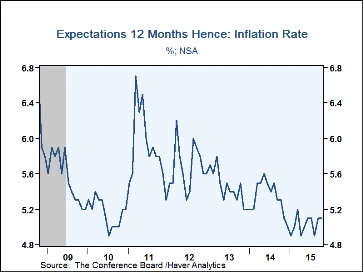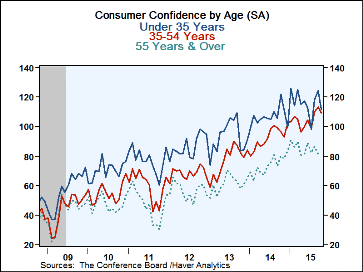 Global| Oct 27 2015
Global| Oct 27 2015U.S. Consumer Confidence Retreats to Three-Month Low
by:Tom Moeller
|in:Economy in Brief
Summary
The Conference Board's Consumer Confidence Index in October unexpectedly reversed improvement during the prior two months. The overall index declined 4.9% to 97.6 but remained up 3.7% y/y. The consensus expectation was for a level of [...]
The Conference Board's Consumer Confidence Index in October unexpectedly reversed improvement during the prior two months. The overall index declined 4.9% to 97.6 but remained up 3.7% y/y. The consensus expectation was for a level of 102.8 in the Action Economics Forecast Survey. The reading of the present situation declined 6.8% (+18.7% y/y) to the lowest level since June. Consumer expectation eased 3.1% (-6.2% y/y), off for the fourth straight month.
Fewer respondents perceived that the present business situation was good but the disappointment was slight. That was followed by fewer perceiving that jobs were plentiful. Nevertheless, jobs were viewed as hard to get by a slightly increased 52.0% of respondents, though that remained down sharply from the August high of 56.2%.
The expected outlook similarly deteriorated but by less than the appraisal of the current situation. The decline was led by fewer respondents believing there would continue to be more jobs accompanied by fewer who expected an increase in income. The percentage who thought business conditions would get better held steady near the middle of the range of the last year. Expectations for the inflation rate in twelve months also held steady at 5.1%, the upper end of the range during the last year.
Buying plans included the highest percentage of respondents planning to by a new home in nearly a year. Plans to buy an existing home were not strong, however, contrary to last week's reading of near-record sales. Plans to buy a major appliance sales strengthened, but the degree was not high and plans to buy an automobile deteriorated, notably for a used one.
By age group, confidence amongst those under age 35 fell to the lowest level in three months. Confidence also was depressed for folks in their middle-age. Confidence amongst individuals over age 55 similarly eased, but just slightly m/m. Confidence in this group was down sharply, however, from where it was at the beginning of the year.
The Consumer Confidence data is available in Haver's CBDB database. The total indexes appear in USECON and the market expectations are in AS1REPNA.
| Conference Board (SA, 1985=100) | Oct | Sep | Aug | Y/Y % | 2014 | 2013 | 2012 |
|---|---|---|---|---|---|---|---|
| Consumer Confidence Index | 97.6 | 102.6 | 101.3 | 3.7 | 86.9 | 73.2 | 67.1 |
| Present Situation | 112.1 | 120.3 | 115.8 | 18.7 | 87.4 | 67.6 | 49.8 |
| Expectations | 88.0 | 90.8 | 91.6 | -6.2 | 86.6 | 77.0 | 78.6 |
| Consumer Confidence By Age Group | |||||||
| Under 35 Years | 111.9 | 124.4 | 118.0 | -8.2 | 106.6 | 93.1 | 86.5 |
| Aged 35-54 Years | 109.2 | 113.2 | 109.9 | 13.3 | 92.4 | 76.8 | 68.5 |
| Over 55 Years | 81.5 | 81.8 | 86.8 | 1.5 | 73.8 | 61.2 | 56.7 |
Tom Moeller
AuthorMore in Author Profile »Prior to joining Haver Analytics in 2000, Mr. Moeller worked as the Economist at Chancellor Capital Management from 1985 to 1999. There, he developed comprehensive economic forecasts and interpreted economic data for equity and fixed income portfolio managers. Also at Chancellor, Mr. Moeller worked as an equity analyst and was responsible for researching and rating companies in the economically sensitive automobile and housing industries for investment in Chancellor’s equity portfolio. Prior to joining Chancellor, Mr. Moeller was an Economist at Citibank from 1979 to 1984. He also analyzed pricing behavior in the metals industry for the Council on Wage and Price Stability in Washington, D.C. In 1999, Mr. Moeller received the award for most accurate forecast from the Forecasters' Club of New York. From 1990 to 1992 he was President of the New York Association for Business Economists. Mr. Moeller earned an M.B.A. in Finance from Fordham University, where he graduated in 1987. He holds a Bachelor of Arts in Economics from George Washington University.
More Economy in Brief
 Global| Feb 05 2026
Global| Feb 05 2026Charts of the Week: Balanced Policy, Resilient Data and AI Narratives
by:Andrew Cates










